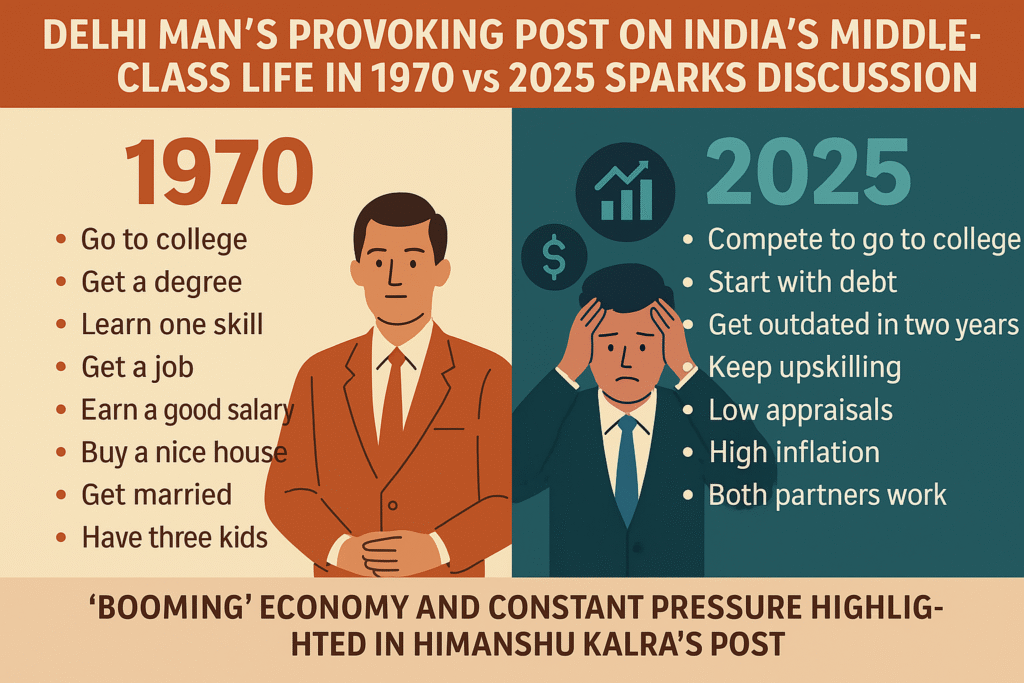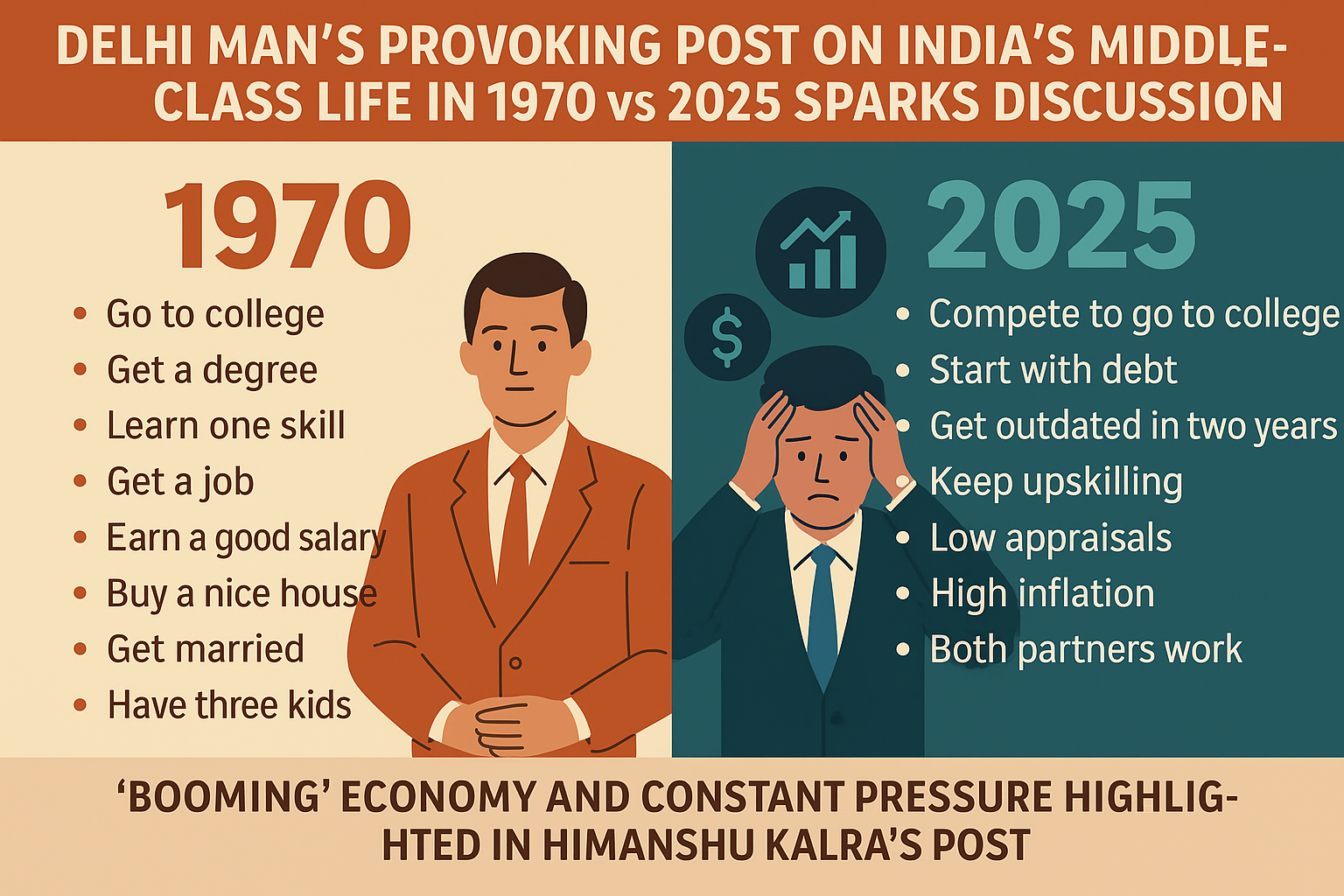
Himanshu Kalra’s Provoking Post on India’s Middle-Class Life from 1970 to 2025 Sparks Intense Discussion
A thought-provoking narrative about India’s changing middle-class lifestyle has gone viral, triggering conversations across LinkedIn and other social media platforms. The Provoking Post was shared by Himanshu Kalra, the founder of a Delhi-based company, who contrasted the stability of the 1970s with the high-pressure and competitive environment of 2025. His reflection on the evolution of middle-class life struck a chord with thousands of users and ignited a national dialogue about success, financial pressure, and mental well-being in modern India.
Simpler Days of the 1970s
In his Provoking Post, Kalra painted a picture of life in the 1970s that many Indians remember with nostalgia. “In 1970,” he wrote, “you go to college, get a degree, learn one skill, get a job, earn a good salary, buy a nice house, get married, have three kids, and you’re set for life.” This description of a linear, dependable path to stability resonated with many readers, who recalled an era when life felt predictable and manageable.
The Provoking Post emphasized how that structure gave people the freedom to plan long-term, knowing their skillset would remain valuable over decades. There were fewer entrance exams, fewer credentials to chase, and fewer financial hurdles to cross before reaching life’s milestones. Jobs were more secure, and inflation did not eat into every pay raise.
The Stress-Filled Reality of 2025
Kalra then compared this tranquil past to the modern-day reality. In his Provoking Post, he highlighted how 2025 is dominated by cutthroat competition, unsustainable inflation, and the constant demand for upskilling. Today’s middle-class journey starts with fierce competition just to enter college, often burdened by student loans. Degrees become obsolete within years, and individuals are forced to learn new skills repeatedly to stay relevant in the job market.
The Provoking Post also pointed out that today, both partners typically work—not for luxury, but to afford a modest lifestyle and raise even a single child. Job appraisals remain minimal, inflation is high, and the rising cost of living forces many to push off buying a house or starting a family. In a touch of biting irony, Kalra concluded: “But sure, the economy’s ‘booming.’”
Public Reaction to the Provoking Post
Kalra’s Provoking Post opened the floodgates for discussion. It resonated deeply with young professionals, parents, and even retirees who could identify with both sides of the comparison. One user wrote, “You are absolutely right,” attributing the drastic shift to India’s explosive population growth and the fierce competition that followed. “Now there’s an entrance exam for everything,” the user added.
Another commenter remarked, “The never-ending cycle of upskilling, inflation, and mental health struggles? That’s the reality for many today.” This candid acknowledgment of the mental toll modern life takes made the Provoking Post even more powerful.
Yet, not all reactions were grim. One optimistic voice suggested, “If you learn how to invest well from your first salary, you can live easy in any era. Life’s not a competition. Just relax and enjoy your time on the planet.” While this may not reflect the experience of all, it provided a much-needed reminder of personal agency amidst systemic stress.
A balanced take came from another user who commented on the Provoking Post: “Yes, there’s more opportunity today, but also more overwhelm. In the 1970s, success was linear. In 2025, it’s iterative. We’re not building one life — we’re rebuilding it, skill by skill, every 2-3 years.”
A Mirror to India’s Changing Socioeconomic Landscape
The Provoking Post struck a nerve because it accurately reflects the broader changes in India’s socioeconomic structure. The Indian middle class has expanded exponentially since the 1970s, but so have the pressures and expectations. Globalization, rapid technological advancement, and shifting cultural norms have made life in 2025 a far cry from what it was half a century ago.
In the 1970s, having a government job, owning a home, and raising three children was considered the epitome of success. Today, success is more fluid, constantly reshaped by startup culture, technological shifts, gig economy trends, and social media-fueled comparisons. Kalra’s Provoking Post brought this transformation into sharp focus, capturing the tension between progress and pressure.
The Role of Social Media in Amplifying Truth
LinkedIn, a platform primarily used for professional networking, has recently become a space for reflective, personal narratives. Kalra’s Provoking Post is a prime example of how the platform is evolving. Its viral success shows that professionals are no longer just interested in resumes and promotions—they also crave discussions about mental health, financial stress, work-life balance, and generational change.
What made the Provoking Post especially impactful was its honesty. It didn’t sugarcoat the past or glorify the present. Instead, it held up a mirror to society and invited users to ask: Has modern life made us more successful or just more stressed?
Why This Provoking Post Matters Now
Kalra’s Provoking Post comes at a time when India is undergoing massive generational shifts. Millennials and Gen Z are navigating a world with no clear blueprint. Unlike their parents and grandparents, they can’t rely on a single job, a lifelong career, or even stable financial systems. The traditional trajectory has collapsed, replaced by a complex web of paths that demand constant adaptation.
This Provoking Post resonates because it doesn’t just compare two points in time—it invites introspection. It forces us to consider what we’ve gained and lost in the name of progress. Is constant competition the price of opportunity? Can economic growth justify emotional burnout?
A Call to Redefine Success
The Provoking Post also functions as a call to redefine what success means in 2025. Perhaps it’s time to move away from rigid expectations and embrace fluidity. Today’s professionals might change careers multiple times, raise one child instead of three, and rent instead of owning—but that doesn’t mean they are less successful.
Kalra’s Provoking Post encourages us to value adaptability, resilience, and balance over traditional markers of success. It reminds us that while we may have left behind the stable jobs of the 1970s, we have also gained access to global opportunities, flexible work, and diverse career paths—if we can navigate them wisely.
Final Thoughts
Himanshu Kalra’s viral Provoking Post was more than just a personal opinion—it became a lens through which India examined itself. It challenged romanticized views of the past and unchecked optimism about the future. By highlighting the chaos, debt, and constant hustle of modern life, the post gave voice to millions who feel caught in a cycle of expectations they never signed up for.
And yet, in acknowledging the differences between 1970 and 2025, the Provoking Post offered hope. It reminded readers that while the world has changed, the conversation about what truly matters—stability, purpose, and well-being—is just getting started.
